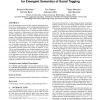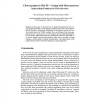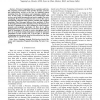350 search results - page 37 / 70 » Predicting how ontologies for the semantic web will evolve |
WWW
2009
ACM
14 years 8 months ago
2009
ACM
Social bookmarking systems and their emergent information structures, known as folksonomies, are increasingly important data sources for Semantic Web applications. A key question ...
LREC
2008
13 years 9 months ago
2008
Acquiring knowledge from the Web to build domain ontologies has become a common practice in the Ontological Engineering field. The vast amount of freely available information allo...
WISE
2003
Springer
14 years 25 days ago
2003
Springer
Semantic web services hold the promise of greatly increasing interoperability among software agents and web services by enabling content-based (as opposed to format-based) automat...
SEMWEB
2005
Springer
14 years 1 months ago
2005
Springer
Abstract. In this paper we describe how we handle heterogeneity in web service interaction through a choreography mechanism that we have developed for IRS-III. IRS-III is a framewo...
CIB
2004
13 years 7 months ago
2004
Abstract-- Pervasive Computing refers to a seamless and invisible computing environment which provides dynamic, proactive and context-aware services to the user by acquiring contex...



